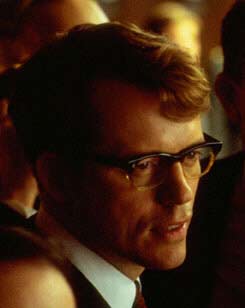Accent-u-Ating RFK
Steven Culp delved into research for his
spot-on performance as Bobby Kennedy in 'Thirteen Days'
Ritz-Carlton Hotel, San Francisco, CA
(c) SplicedWire.com
January 8, 2001
By Rob Blackwelder
"It was one scene with Mira Sorvino (as Marilyn), and I did it in an afternoon," Culp laughs. "I had my own hair cut, the clothes were too big for me so I had to sit the whole time. But even back then I remember laughing at myself because I did what seemed to be an inordinate amount of research and preparation for this three-page scene." In San Francisco last week to promote "Thirteen Days" -- in which he gives an penetrating, three-dimensional performance as the then-Attorney General and closest adviser to his brother, the President -- Culp spoke of the obligation an actor feels playing such a high profile historical figure. "When you're playing one of these icons, there's a certain number of things you have to have assimilated," he says. "You have to have them almost second nature by the time you say the first line. It involves a lot of preparation and meditation, I think. Watching tapes, listening to tapes, stuff like that." And that was just for the HBO film, Culp emphasizes. "The preparation for this movie was like that times 1,000." In this film, Culp and Bruce Greenwood ("Double Jeopardy") play Bobby and Jack to Costner's Kenny O'Donnell, a Harvard pal of the Kennedys' who became a White House insider. O'Donnell serves as the picture's window into the pressure-cooker atmosphere of the American presidency during the two weeks in 1962 when the world held its breath, while the United States and the USSR stood on the brink of nuclear war over ICBMs placed 90 miles off the Florida coast. Today Culp still looks eerily like his character, even without the Kennedy haircut, the glasses and the prosthetic teeth used to mold his visage for the film. He's certainly easy-going, but as he talks about the responsibility he felt and the process he went through to play Bobby as accurately as possible, he speaks and gestures with Kennedy-like import. "It was like I was in boot camp. I'd get up at 6 in the morning and go to bed at 11 at night. I was working with a trainer to get that really wiry, Bobby Kennedy body," Culp describes, slipping ever-so-slightly into his character's accent. "Listening to tapes, working on the dialect, watching tapes, reading, getting fitted for teeth, wardrobe, hair color -- it was really intense. But by the time we started shooting, I felt like we really hit the ground running." Asked if the character invaded his private life at all, Culp laughs, admitting there were days when his wife woke up in bed next to Bobby Kennedy. "But she put up with that stuff. I used have two Walkmans. I would play a (RFK) speech on one (and speak into) the other as the speech was playing in my head. Then I would compare the two. A couple times I would take the tape player in the house and go 'Which one?' When she couldn't tell the difference, I knew I was on the right track." The actor's research included reading O'Donnell's memoirs (in which, Culp says, he writes Bobby "was not a simple man, he was a great many simple men") and Arthur Schlesinger Jr.'s RFK biography, which describes the man's "experiencing nature." "He's always in development. He's always in evolution. He's always changing. And usually for the better," Culp says, noting that David Self's screenplay for "Thirteen Days" captured that element of the character. "I think David's script allows you to play all the different contradictions and all the different colors. It's there on the page so you can get it all in -- the ruthless guy who runs interference for his brother and does all the dirty work, the guy everybody is afraid of but at the same time is very passionate and sensitive and moral and painfully shy." "Physically it's the same thing. He was a very driven athlete, yet you watch films and you see something almost delicate and fragile about him. In 'Norma Jean and Marilyn,' you were seeing him through this very narrow prism, where as here it's the whole spectrum of colors." Culp truly captures all of this in his performance, which for some reason isn't garnering as much attention as Greenwood's solid but far less precise turn as big brother Jack, which has Oscar pundits buzzing. It's ironic Culp's performance seems more precise considering he felt he had more freedom for interpretation playing the lesser-known Kennedy. I used to joke with Bruce about it because he has the more difficult job," Culp says. "He's like John Lennon or Elvis. I'm like (Bob) Dylan. I'm a little more elusive. There's a little more wiggle room for me. People's vision is not so fixed as it is with JFK. I think a part of that is that JFK was killed at sort of the height of his career. Bobby is still in a process of evolution the entire time. He's always changing, and you get the feeling the potential had not been fully tapped when he was killed." |
DISCLAIMER: This site is a Steven Culp fan site and is not affiliated with Steven Culp, his family or any of his representatives.
Unless otherwise noted, all captures were made by me from videos from various sources. All shows and photos belong to their respective owners.
NO COPYRIGHT INFRINGEMENT INTENDED!
© 2004-2022 SConTV.com and Steven-Culp.com
Unless otherwise noted, all captures were made by me from videos from various sources. All shows and photos belong to their respective owners.
NO COPYRIGHT INFRINGEMENT INTENDED!
© 2004-2022 SConTV.com and Steven-Culp.com
